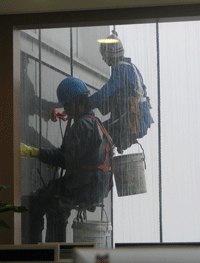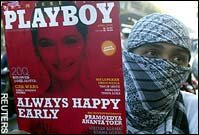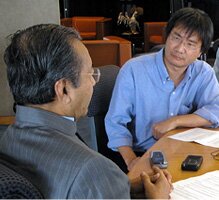Singapore’s Prime Minister Lee Hsien Loong mentioned mr brown, and the government’s role in his termination from the Today newspaper, in the recent National Day address. A Singapore Angle has the transcript, with the below passage:
So I give you the example of Mr Brown’s column in Today. Some of you may have read it, some of you may not. But it hit out wildly at the government and in a very mocking and dismissive sort of tone. So MICA [Ministry of Information, Communications and the Arts] replied. How can you not reply? And some Singaporeans feel we were too harsh, we should have been gentler, or maybe just even accepted it, it is just niceness, he didn’t mean us any harm.
Well, my view is like this: Mr Brown is very talented man (in fact he is Mr Lee Kim Mun). If you listen to his podcasts, they are hilarious. And he is entitled to his views, and entitled to express them. But when he takes on the government and makes serious accusations, as he did in this case because he said the government suppressed information before the elections which was awkward and only let it out afterwards, then the government has to respond, firstly to set the record straight, and secondly to signal that this is really not the way to carry on a public debate on national issues and especially not in the mainstream media.
As noted earlier, and as explained by mr brown this week, the government’s right of response is not a concern. The concern is the silencing of dissent, through the sacking of mr brown from Today and the refusal of the newspaper to print any further replies in defense of mr brown. This is said here by mr brown.:
I believe the Government has every right to respond to my Humour column. I may disagree with what they say but it is their right to respond.
I also believe in responding in turn to what the Government said in their letter, but my Humour column was suspended immediately after their letter was printed. Perhaps Mediacorp/TODAY did not stand by what they published?
…
I understand that many people did respond on the matter by writing in to the mainstream press, but none of their letters were published by mainstream media. Not a single one. Some people who wrote to TODAY about the column’s suspension received a templated response to write to MICA instead, even though TODAY were the ones who suspended the column. Strange.
An equally controversial element of the National Day speech was Lee’s comment that he orders his noodles without cockles. While AsiaPundit has not found the moment in the transcript, mr brown has captured the controversial utterance in his latest podcast.
Xenoboy explains the significance:
When PM Lee in his Rally Speech delivers the ultimate punchline to lay the bak chor mee to rest, to signal Government’s engagement with the Digital Age Singaporean, those dreaming of somewhere else, he utters the phrase “Mee Siam Mai Hum”.
This becomes an instant classic of dis-connect….
Read the whole thing. The disconnect is explained in this passage:
Mee Siam has never had cockles as an ingredient. Two other distinctly Singapore dishes use cockles. Laksa and Fried Kway Teow Noodles. Most Singaporeans know this. Its a fact of life.
To put it simply, most Singaporeans will NOT make this mistake. Its like ordering bak kut teh, another classic Singapore dish, without the soup. Ordering pizza and telling the chef to hold the dough. No, actually its worse. Its like ordering pizza and telling the chef to hold the spaghetti. In short, the phrase “Mee Siam Mai Hum” is an oxymoron. Its like one of those chain e-mail wordplay jokes “military intelligence”.
From what I understand, our esteemed national newspaper, the Straits Times, “heard” and interpreted the crucial phrase as “Mee Siam Mai Hiam”; which means hold the chilli. If this “hearing” is correct, than the phrase is meaningless as a direct riposte against the bak chor mee podcast. I guess the ST is not being honest again. Its “hearing” certainly connects with PM Lee but it means all the rest of Singaporeans “heard” wrongly, very dis-connected.
Image taken from Sei-ji Rakugaki’s Sketchbook, a full size and legible version is here.
While we will not discuss it in detail here, Lee’s comments were in reaction to an earlier satirical podcast by mr brown. See Jeff Ooi for more details on that
Technorati Tags: asia, censorship, east asia, internet, singapore, southeast asia
 Reporters Without Borders today condemned the Singapore government for putting pressure on on the Far Eastern Economic Review and four other foreign publications to censor themselves.
Reporters Without Borders today condemned the Singapore government for putting pressure on on the Far Eastern Economic Review and four other foreign publications to censor themselves.



 “As more and more illegal and unhealthy information spreads through the blog and search engine, we will take effective measures to put the BBS, blog and search engine under control,” said Cai Wu, director of the Information Office of China’s Cabinet, quoted by the official Xinhua News Agency.
“As more and more illegal and unhealthy information spreads through the blog and search engine, we will take effective measures to put the BBS, blog and search engine under control,” said Cai Wu, director of the Information Office of China’s Cabinet, quoted by the official Xinhua News Agency. Unlike the first edition, the 160-page second edition contains no paid advertisements. Instead, there are almost entirely blank pages featuring only the Playboy bunny logo in different colors and a short message headlined “Playbill”. The message states: “This blank page is dedicated to our loyal clients who were threatened for placing advertisements in this magazine.” Each message then mentions a product that should have appeared, for example: “This page is owned by a cigarette product” and “This page is owned by a cellular telephone product”.
Unlike the first edition, the 160-page second edition contains no paid advertisements. Instead, there are almost entirely blank pages featuring only the Playboy bunny logo in different colors and a short message headlined “Playbill”. The message states: “This blank page is dedicated to our loyal clients who were threatened for placing advertisements in this magazine.” Each message then mentions a product that should have appeared, for example: “This page is owned by a cigarette product” and “This page is owned by a cellular telephone product”. They are the handiwork of the lukayo, women way past their sexual prime who dance at weddings where they wave the phalluses like trophies, brandish them like swords, twirl them like batons, or thrust them like, well, phalluses.
They are the handiwork of the lukayo, women way past their sexual prime who dance at weddings where they wave the phalluses like trophies, brandish them like swords, twirl them like batons, or thrust them like, well, phalluses. While AsiaPundit is deeply concerned that his chosen profession is the most dangerous in his city of residence, he is a touch relieved. AP has been periodically concerned by some of the occupational risks he has seen others take in the city. But upon learning that he is in the most risky profession, he will be more relaxed.
While AsiaPundit is deeply concerned that his chosen profession is the most dangerous in his city of residence, he is a touch relieved. AP has been periodically concerned by some of the occupational risks he has seen others take in the city. But upon learning that he is in the most risky profession, he will be more relaxed.
 Indonesia’s secular identity is under threat from a proposed, Islamic-inspired anti-pornography law that would satisfy increasingly militant Muslims but begin curtailing the rights of the majority moderate followers of the faith. There is no room for such legislation in a country fighting to maintain the democratic freedoms it won so boldly by forcing dictator Suharto’s resignation eight years ago.
Indonesia’s secular identity is under threat from a proposed, Islamic-inspired anti-pornography law that would satisfy increasingly militant Muslims but begin curtailing the rights of the majority moderate followers of the faith. There is no room for such legislation in a country fighting to maintain the democratic freedoms it won so boldly by forcing dictator Suharto’s resignation eight years ago. APTN, the television arm of the Associated Press news agency, has become the first western media organisation to open a bureau in Pyongyang.
APTN, the television arm of the Associated Press news agency, has become the first western media organisation to open a bureau in Pyongyang. Malaysiakini editor Steven Gan who led his team of journalists to interview Dr Mahathir on May 16, a request denied for six long years and postponed three times after a consent was given in March this year, came home with two unmistaken conclusions.
Malaysiakini editor Steven Gan who led his team of journalists to interview Dr Mahathir on May 16, a request denied for six long years and postponed three times after a consent was given in March this year, came home with two unmistaken conclusions.
 A wide range of investors, including retirees and Wall Street professionals, attended the meeting at Google’s Mountain View campus. They peppered the two founders and Chief Executive Eric Schmidt with questions about everything from new products to sluggish e-mail to competition with Microsoft and Yahoo.
A wide range of investors, including retirees and Wall Street professionals, attended the meeting at Google’s Mountain View campus. They peppered the two founders and Chief Executive Eric Schmidt with questions about everything from new products to sluggish e-mail to competition with Microsoft and Yahoo. What I didn’t bargain for was individual self-censorship, unspoken policies and rules, and the stoutness with which people swallowed their journalistic dignity and integrity (because it does exist, even strongly, in some places) to toe the party line. Incredible as it seems, reporters in Singapore do have the same fierce pride in their work as reporters anywhere else; I think this is especially evident in sections of the media that don’t touch on politics.
What I didn’t bargain for was individual self-censorship, unspoken policies and rules, and the stoutness with which people swallowed their journalistic dignity and integrity (because it does exist, even strongly, in some places) to toe the party line. Incredible as it seems, reporters in Singapore do have the same fierce pride in their work as reporters anywhere else; I think this is especially evident in sections of the media that don’t touch on politics.
 The Hong Kong Journalists Association and Reporters Without Borders have campaigns to save Ching Cheong, a Hong Kong journalist charged by China with spying. RSF says he faces a possible death sentence although the Chinese authorities have produced no evidence against him.
The Hong Kong Journalists Association and Reporters Without Borders have campaigns to save Ching Cheong, a Hong Kong journalist charged by China with spying. RSF says he faces a possible death sentence although the Chinese authorities have produced no evidence against him. Reporters Without Borders today said it considered Chinese blogger Hao Wu to be the victim of state abduction as more than two months have gone by since his arrest by the National Security Bureau in Beijing without his family getting any news about him. His lawyer has not been allowed to see him, but has been told his client is under house arrest.
Reporters Without Borders today said it considered Chinese blogger Hao Wu to be the victim of state abduction as more than two months have gone by since his arrest by the National Security Bureau in Beijing without his family getting any news about him. His lawyer has not been allowed to see him, but has been told his client is under house arrest.
 Unlike Hong, the comic book artists of post-WWII era were not so funny. By far the most famous and influential comic book artist of the 1950s was the pseudonymous writer named “Brother Cow,” 牛哥 (1925-1997), whose real name was Lee Fei-meng (李費蒙). Lee was a mainlander who escaped from China and came to Taiwan with the KMT in 1949. His anti-Communist strips were characterized by stupid, Ah-Q looking Chinese characters with buck teeth and bald heads and evil Communist overlords (some of it displaying a very weird sense of ’self-racism’).
Unlike Hong, the comic book artists of post-WWII era were not so funny. By far the most famous and influential comic book artist of the 1950s was the pseudonymous writer named “Brother Cow,” 牛哥 (1925-1997), whose real name was Lee Fei-meng (李費蒙). Lee was a mainlander who escaped from China and came to Taiwan with the KMT in 1949. His anti-Communist strips were characterized by stupid, Ah-Q looking Chinese characters with buck teeth and bald heads and evil Communist overlords (some of it displaying a very weird sense of ’self-racism’).



































